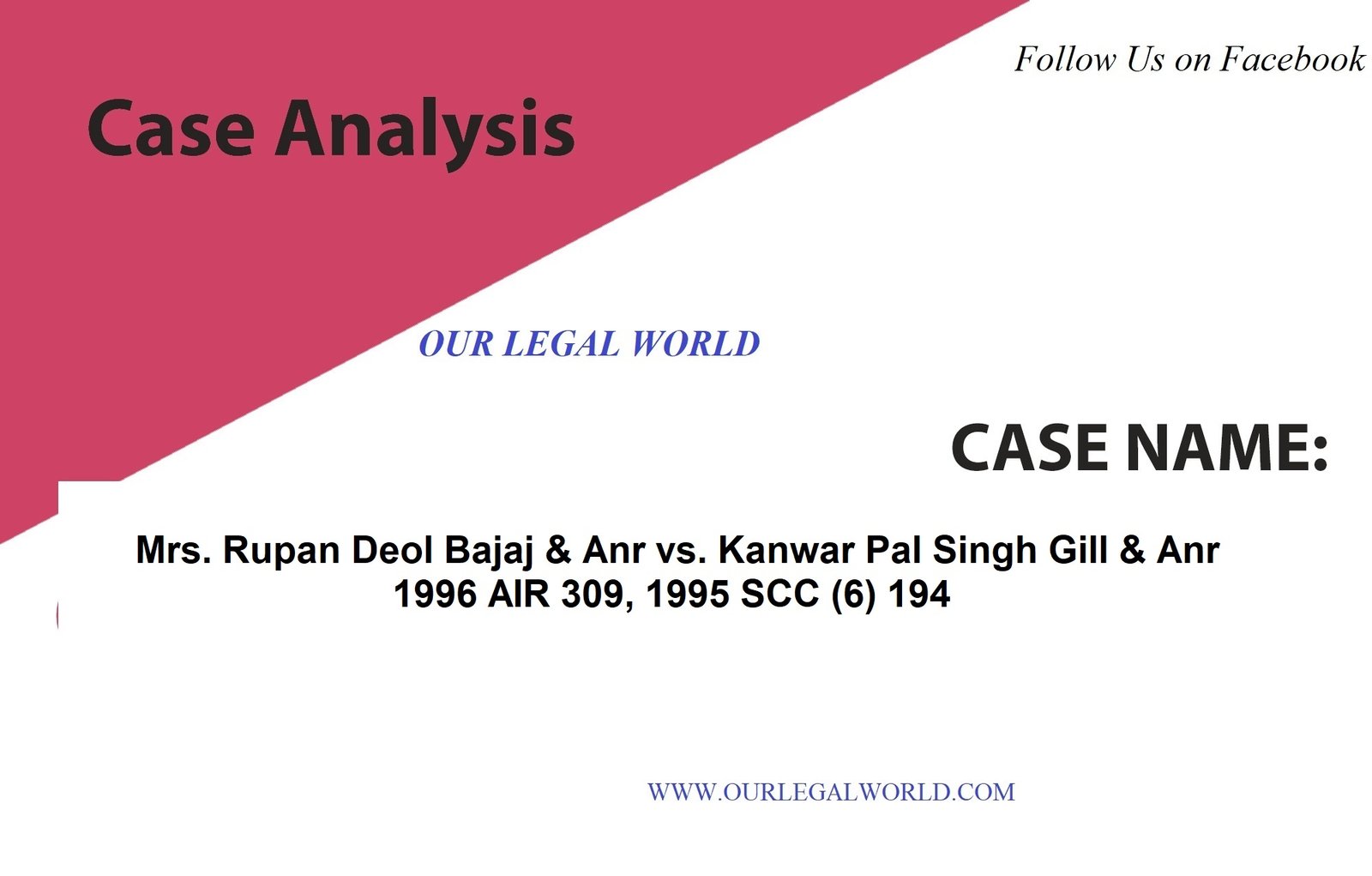Rupan Deol Bajaj and Anr. vs. Kanwar Pal Singh Gill and Anr. :Case Analysis- Our Legal World
In the Supreme Court of India Case No. Criminal Miscellaneous No. 9041-M of 1989 Equivalent Citation: 1996 AIR 309, 1995 SCC (6) 194 Petitioner Mrs. Rupan Deol Bajaj & Anr Respondent Kanwar Pal Singh Gill & Anr Decided on 12th October, 1995 Bench M.K. Mukherjee, A.S. Anand
Introduction:
Women across the globe have raised their voices against the injustice and indeed they have been heard. One such voice was raised by Mrs. Rupan Deol Bajaj, an I.A.S officer, Punjab Cadre, against the highest ranking police officer Mr. K.P.S Gill for molestation. The case dragged on for 17 years with the final judgment of the Supreme Court in 2005. The case gained much popularity in the media as the “butt slapping case.”
Background:
- Mrs. Rupan Deol Bajaj, was invited to a dinner party organized by S.L. Kapoor, the Punjab Financial Commissioner. Mrs. Bajaj went to the party together with her husband Mr. B.R. Bajaj, a senior I.A.S. officer. Several invitees were at the party, including Mr. Gill.
- When Mrs. Bajaj was busy talking to other ladies, Mr. Gill called out to her saying he wanted to speak to her. She excused herself and went to talk to him. It was at this moment, Mr. Gill misbehaved by pulling her chair closer to his, not once but twice. Mrs. Bajaj felt this inappropriate and made her way back to the ladies.
- After a few minutes, Mr. Gill came closer to her and blocked her way. This made her frightened. She stood up to leave whereupon, Mr. Gill slapped her on the posterior.
Facts:
- 18th July, 1988:
Mrs. Bajaj attended the party wherein she was being slapped on the posterior by Mr.Gill
- 29th July, 1988:
Mrs. Bajaj registered a complaint with the Inspector General of Police, Chandigarh, accusing Mr. Gill of offences under Sections 341, 342, 352, 354 and 509 of Indian Penal Code (IPC). The complaint was treated as the FIR and a case was registered at the Central Police Station, Chandigarh. The investigation was also initiated in the matter.
- 22nd November, 1988:
Mr. Bajaj, complained to the Chief Judicial Magistrate (CJM) for the same offences against Mr.Gill. CJM transferred the complaint to the Judicial Magistrate (JM). The JM then asked the Investigating Officer to submit the investigation report.
- 16th December, 1988:
Mr.Gill filed a petition in the Punjab and Haryana High Court under section 482 of the Criminal Procedure Code (Cr.P.C) for quashing the FIR and complaint made against him. The High Court passed an interim order holding investigation into the FIR; however the proceeding concerning the complaint was allowed. As a result, the JM then proceeded with the complaint and heard the matter. It rejected the claim of privilege made under Section 123 and 124 of the Indian Evidence Act, by two witnesses namely Mr. Y.S. Ratra ( IAS Officer of the Government of Punjab) and Mr. J.F. Rebeiro (Adviser to the Government of Punjab).
- 24th January, 1989:
A criminal revision petition was filed by the State of Punjab in the Punjab and Haryana High Court.
- 29th May, 1989:
The High Court heard the petition filed by Mr.Gill under Section 482 of Cr.P.C. The court thereby quashed the FIR and complaint made against him on the following grounds:
- The accusations stated in the FIR do not constitute any cognizable offence.
- The harm caused to Mrs. Bajaj falls within the provisions of Section 95 of IPC.
- The accusations were unusual and inconceivable.
- Section 157 of Cr.P.C does not empower the Investigating Officer to start the investigation in case of non- cognizable offences.
- Unreasonable delay of 11 days in filing the FIR.
It was against this order that Mr. and Mrs. Bajaj filed the present petition in the Supreme Court.
Issues:
- Whether the accusations stated in the FIR account for any offence in the Indian Penal Code?
- Whether the High Court was justified in quashing the FIR and complaint in the exercise of the power given under Article 226 of the Constitution?
Critical Analysis:
- The learned counsel for the petitioners while advancing her argument stressed on the fact that Section 482 of Cr.P.C. which saves the inherent powers of the High Court does not include quashing of FIR in case of cognizable offences.
- The applicability of Section 95 IPC was highly criticized as outraging a woman’s modesty cannot be considered as a trivial matter.
- Delay in filing the FIR cannot be a valid ground for quashing it as the reason for the delay was itself Stated in the FIR.
- The learned Additional Solicitor General for the respondent submitted that the reasons stated by the High Court for quashing the FIR was reasonable.
Judgment:
- On plain reading of Section 354 and 509 IPC and considering the judgment given by this Court in the State of Punjab vs. Major Singh (AIR 1967 SC 63), it was held that the act of slapping on the posterior of a woman amounted to outrage her modesty. Also, the main ingredient of Section 354 that is “culpable intention” was said to be possessed by Mr.Gill based on the circumstances given.
- The accusations stated under section 341, 342 and 352 IPC cannot be said to have been committed by the respondent. Hence, the accusations in respect of the said section do not make up for any offence.
- The High Court was not justified in the application of Section 95 in the present case. The Supreme Court, thereby set aside the judgment delivered by the High Court and dismissed the petition filed by Mr.Gill under Section 482 Cr.P.C.
- The Apex Court further directed that the Chief Judicial Magistrate should proceed with the case in respect of offences under Sections 354 and 509 and make a decision on the basis of evidence produced before it.
Later proceedings:
- Chief Judicial Magistrate’s decision:
As per the direction given by the Supreme Court, the Chief Judicial Magistrate conducted a trial. The accused was held guilty under section 354 and 509 IPC. He was sentenced to 3 months of imprisonment and fine of Rs. 500 in respect of offence under section 354 and 2 months of imprisonment with fine of Rs. 200 in respect of section 509.
- Sessions Court decision:
The accused appealed to the Sessions Court, which confirmed the conviction and directed the accused to be released on probation. The fine imposed was increased to rupees fifty thousand.
-
High Court decision:
Aggrieved by the decision of the Sessions Court, the accused filed an appeal in the Punjab and Haryana High Court. The Court upheld the decision of the Sessions Court, however the amount of the fine was increased to 2 lakh rupees. Further, the accused was asked to pay an additional sum of rupees twenty five thousand to Mrs. Bajaj for the cost of litigation incurred.
-
Supreme Court decision:
The decision of the High Court was appealed in the Supreme Court by the accused as well as the complainant (Mrs. Bajaj). The accused challenged his conviction and sentence of imprisonment in the petition “Kanwar Pal Singh Gill vs. State (Criminal Appeal 1032 of 1998)”. While the complainant prayed for the enhancement of the punishment imposed on the accused in the petition “Mrs. Rupan Deol Bajaj vs. Kanwar Pal Singh Gill (Criminal Appeal no. 430 of 1999)”. The Apex Court was of the view that the appeals were without any substance and thereby dismissed both the appeals.
Also Read: LEGAL MAXIM: Ratio Decidendi- Our Legal World
Conclusion:
Mrs. Rupan Deol Bajaj, through her long battle has inspired many women worldwide. This case was the first of its kind to give a wide interpretation to the word “modesty”. It has been observed that the High Court while exercising power under section 482 Cr.P.C must show utmost care. In 2010, she made a request to the Government to take back the Padma Shri award given to Mr. KPS Gill.
References:
- https://indiankanoon.org
- Mrs. Rupan Deol Bajaj & Anr vs Kanwar Pal Singh Gill & Anr
- https://en.m.wikipedia.org
- https://lawtimesjournal.in/mrs-rupan-deol-bajaj-anr-vs-kanwar-pal-singh-gill-anr/






![Tax Law Internship at Legum Attorney [Chamber of Ashish Panday], Delhi : Apply by 15th May 2025](https://www.ourlegalworld.com/wp-content/uploads/2025/05/IMG_0113-min.png)

